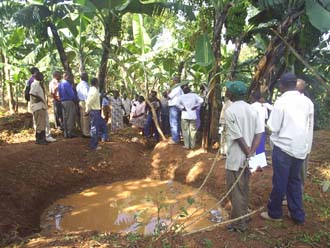| Uganda registers success in the fight against banana bacterial wilt disease |  |  |  |
| Written by Pius Sawa | |
| Tuesday, 12 August 2008 | |
|
Banana is a staple crop that determines the livelihoods of majority rural farmers besides maize. The state minister for Agriculture, Bright Rwamirama told Africa Science News Service that this has been achieved through farmer field schools--- process involving groups of farmers under the guidance of a facilitator on community based and practically oriented study in combination with other different approaches. Farmer field schools empower farmers to make logical crop management decisions, exposes farmers to new ways of thinking and problem solving, implement own solutions and shortens the time between Research stations to technology adoption. The banana bacterial wilt was first reported in Mukono and Kayunga districts in 2001 and has since been reported in 38 districts. It was estimated to have destroyed 90% of the bananas an equivalent of USD 4 billion in Uganda by 2010 if not controlled. Food and Agriculture Organisation (FAO) supported efforts of Government of Uganda with USD 400,000 to establish 100 farmer field schools in order fight Banana Bacterial wilt in 5 districts of Mbarara, Mukono, Kiboga, Kamuli and Lira.
"Using farmer field schools and other participatory approaches, more than 90% of the outbreaks south of the stretch from Lake Victoria and Mt. Rwenzori, the area that produces more than 85% of Uganda's bananas have been effectively controlled. In affected sub counties, bananas valued at USD 203 million have therefore been protected," said Minister Rwamirama. He says in addition, participating farmers have learnt how to control other pests and diseases plus managing soil nutrition and water conservation. The farmer field schools make the cost of extension cheap; as the participating farmer form a community based agricultural extension network – the sub county or district officer only doing the backstopping role. These farmer field schools could be strong cornerstones for the vibrant cooperative movement as the Farmer field schools seek to network region-wide. In order to ensure improved food security and prosperity for many more Ugandans, Mr. Rwamirama said the government and non-governmental agencies involved in agricultural development should adopt farmer field schools as an approach of agricultural extension. |
--
Jean-Louis Kayitenkore
Procurement Consultant
Gsm: +250-08470205
Home: +250-55104140
P.O. Box 3867
Kigali-Rwanda
East Africa
Blog: http://www.cepgl.blogspot.com
Skype ID : Kayisa66
 The Uganda Government has announced today its success in eradicating banana wilt disease,
The Uganda Government has announced today its success in eradicating banana wilt disease, 
 Annually, over 9.7 million tons of bananas valued at USD 550.6m were produced in the country and over 7 million Ugandans depend on the crop as their staple and income.
Annually, over 9.7 million tons of bananas valued at USD 550.6m were produced in the country and over 7 million Ugandans depend on the crop as their staple and income. 



No comments:
Post a Comment